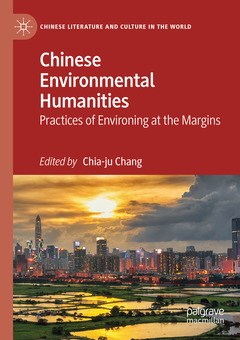1. Introductory Chapter/ Environing at the Margins: Huanjing as a Critical Practice / Chia-ju Chang
1.1 Why does China Matter?: From Industrial Modernity to Ecological Civilization
1.2 Sketching a Field: Chinese Environmental Humanities (CEH)
1.3 Two Keywords in CEH
1.3.1 China and Hong Kong
1.3.2 Beyond China and Hong Kong
1.4 Chapter Outline
1.4.1 Huanjing and the Practice of Environing
1.4.2 Ziran and Nature
1.5 Chapter Outline
1.6 Conclusion
Section I: Chinese Ecocriticism and Ecotranslation Studies
2. Chapter One Building a Post-Industrial Shangri-La: Lu Shuyuan, Ecocriticism, and Tao Yuanming’s “Peach-Blossom Spring” / Chia-ju Chang
2.1 The Emergence of Ecological Discourses and Ecocriticism in the Cultural and Academic Domains
2.2 Lu Shuyuan and Spiritual Ecology (Jingshen Shengtai)
2.3 Tao Yuanming’s Lost Generation: Migrant Workers’ “Moonlight Poetry” and Tao Yuanming’s “Specters”
2.4 The Peach-Blossom Spring: Cultural Imagination and Beyond
2.5 Conclusion
3. Chapter 2 The Nakedness of Hope: Solastalgia and Soliphilia in the Writings of Yu Yue, Zhang Binglin, and Liang Shuming / Stephen Roddy
3.1 The Evil Twins of Materialism and Militarism
3.2 Revolution, Not Evolution!
3.3 Life, The Supreme Good
3.4 Reviving Hope, Nakedly
4. Chapter 3 Blurred Centers/Margins: Ethnobotanical Healing in Writings by Ethnic Minority Women in China / Dong Isbister, Xiumei Pu and Stephen Rachman
4.1 Allegorical Marginality: Herbs as Agents of Healing
4.2 Cosmic Transcendence: “Snow Lotus”
4.3 Conclusion
5. Chapter 4 From Jiang Rong to Jean-Jacques Annaud: An Ecological Rewrite of Wolf Totem / Runlei Zhai
5.1 Annaud’s Focus on the Ecological Theme
5.2 The Ecological Theme as a Trans-national and Trans-cultural Bridge
5.3 Gain and Loss in the Ecological Rewrite
5.4 Conclusion
6. Chapter 5 An Ecotranslation Manifesto: On the Translation of Bionyms in Nativist and Nature Writing from Taiwan / Darryl Sterk
6.1 Waiting for the Name of a Flower with Huang Chun-Ming
6.2 Searching For the Name of a Plant With Carl Linnaeus
6.3 Sustaining Bionym Diversity Through Translation
6.4 Translating the Name of a Fig with Wu Ming-Yi
6.5 Conclusion
Section II: Chinese Ecocinema and Ecomedia Studies
7. Chapter 6 Worms in the Anthropocene: The Multispecies World in Xu Bing’s Silkworm Series / Kiu-wai Chu
7.1 Worms in Contemporary Art
7.2 Silkworm Books and the Ecological Art
7.3 Non-human Agencies in the Multispecies World
7.4 Anthropocene Metaphor and the Confucian Eco-Governance
7.5 Concluding Notes: Rethinking Silk Road Culture and Civilization
8. Chapter 7 Place, Animals, and Human Beings: The Case of Wang Jiuliang’s Beijing Besieged by Waste / Haomin Gong
8.1 Place in Beijing Besieged by Waste
8.2 Place of Waste and Urbanization
8.3 Displacement of Commodities in a Consumer Society
8.4 “Waste Becomes Politics”: Human and Animal Positions in a Consumer Society
8.5 Conclusion
9. Chapter 8 Land, Technological Triumphalism and Planetary Limits: Revisiting Human-Land Affinity / Xinmin Liu
9.1 Misconceiving Tech-induced Modernity
9.2 Unmasking the “Wizardry” of Cash Change-over
9.3 Mending Human-Land Affinity
10. Chapter 9 Eco-Media Events in China: From Yellow Eco-Peril to Media Materialism / Ralph Litzinger and Fan Yang
10.1 Eco-media Events
10.2 Media as Mediation
10.3 Media Materialism: Time, Body, and Matter
10.4 Chinese Eco-Media Events in Global Contexts
10.5 Conclusion
Section III: Sustainability, Organic Community, and Buddhist Multispecies Ethics
11. Chapter 10 The Paradox of China’s Sustainability / Christopher K. Tong
11.1 “Three Thousand Years of Unsustainable Growth”
11.2 “Green Paradoxes”
11.3 The Future of China’s Sustainability
12 Chapter 11 Contemplating Land: An Ecocritique of Hong Kong / Winnie L. M. Yee
12.2 Farming as Living and the Tactics of Everyday Life
12.3 The Film Festival as a Cross-cultural Connection
12.4 Planting Hong Kong’s Future and Green Activism
12.5 Conclusion
13 Chapter 12 The Intersection of Sentient Beings and Species, Traditional and Modern, in the Practices and Doctrine of Dharma Drum Mountain / Jeffrey Nicolaisen
13.2 Animals
13.3 Are Trees Sentient?
13.4 Animal Release
13.5 Sheng Yen’s Ecological Views
13.6 Conclusion
14 Chapter 13 An Exposition of the Buddhist Philosophy of Protecting Life and Animal Protection / Chao-Hwei Shih (translated by Jeffrey Nicolaisen)
14.2 Dependent arising, Emptiness, Protecting life, and the Middle Way: The Definition and Connotation of Core Concepts
14.3 The Difference in Treatment Between Sentient Beings and Nonsentient Beings
14.4 The Categorization of the Academic Discipline of Animal Ethics
14.5 Animal Ethics and Ethical Principles
14.6 Justification for the Obligation to Protect Life
14.7 Middle Way: Situational Considerations of the Principle of Equality
14.8 The Middle Way Thinking on Reasonable Self-Defense
14.9 Adjusting to Differences in the Level of Development of Enlightened Nature
14.10 Conclusion




